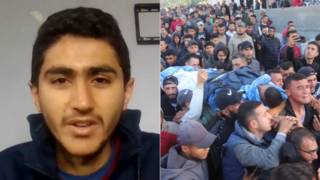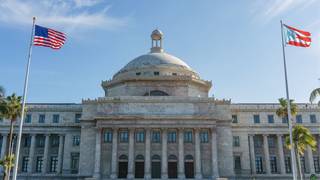
Topics
Guests
- Nydia VelázquezDemocratic congressmember for New York, has served in the U.S. House of Representatives since 1993. She is the first Puerto Rican woman to be elected to Congress and is the former chair of the Congressional Hispanic Caucus.
Puerto Rico could be on the verge of following Greece in defaulting on its debt. Puerto Rico’s government and the Puerto Rico Electric Power Authority say they will miss today’s deadline for more than $1 billion in payments on a debt of more than $73 billion. This comes as Puerto Rico’s unemployment is more than twice the U.S. national rate, and its poverty level is nearly double that of the poorest U.S. state. Meanwhile, Puerto Rico’s healthcare system may also be on the verge of collapse. We are joined by Congressmember Nydia Velázquez, Democrat for New York and the first Puerto Rican woman to be elected to Congress.
Transcript
JUAN GONZÁLEZ: We begin today’s show in Puerto Rico, the U.S. territory that could be on the verge of following Greece in defaulting on its debt. Puerto Rico’s government and the Puerto Rico Electric Power Authority say they will miss today’s deadline for more than $1 billion in payments on a debt of more than $73 billion. In an interview with The New York Times, Puerto Rican Governor Alejandro García Padilla admitted, quote, “The debt is not payable. There is no other option. I would love to have an easier option. This is not politics, this is math.” During a televised address Monday, García Padilla announced his plans to restructure the debt.
GOV. ALEJANDRO GARCÍA PADILLA: [translated] The goal would be to achieve a negotiated moratorium with the bondholders to postpone for a number of years the debt payments in a way so that we could use that money in these years to pay the debt and invest here in Puerto Rico to create jobs and accelerate the economy.
JUAN GONZÁLEZ: The retired U.S. bankruptcy judge who oversaw Detroit’s bankruptcy has now been retained by Puerto Rico. But the island cannot legally file for bankruptcy because it is a commonwealth. García Padilla called for this to change in Congress.
GOV. ALEJANDRO GARCÍA PADILLA: [translated] It is the moment for us to speak as one voice to demand concrete action from Washington, action from Washington now, action so that they finish approving the changes to Chapter 9 and so that Puerto Rico can count on the same protection that other jurisdictions have.
JUAN GONZÁLEZ: García Padilla has already tried to generate more government revenue with a sales tax increase to 11.5 percent that goes into effect today. He said he would also form a financial team to try and obtain a moratorium on repayments for several years. The team would develop an economic reform that would require legislative approval.
AMY GOODMAN: All of this comes as Puerto Rico’s unemployment is more than twice the U.S. national rate, and its poverty level is nearly double that of the poorest U.S. state. Meanwhile, Puerto Rico’s healthcare system may also be on the verge of collapse. More than two million people, roughly 6 percent of Puerto Rico’s population, rely on Medicare, Medicare Advantage or Medicaid to pay for their healthcare. But the Center for Medicaid and Medicare Services is set to implement an 11 percent cut in Medicare Advantage reimbursements for Puerto Rico, costing the island’s healthcare system an estimated half a billion dollars.
Well, for more, we’re joined by New York Congressmember Nydia Velázquez. She has served in the House of Representatives since 1993. She’s the first Puerto Rican woman to be elected to Congress and is the former chair of the Congressional Hispanic Caucus.
Welcome to Democracy Now!
REP. NYDIA VELÁZQUEZ: Thank you.
AMY GOODMAN: It’s great to have you with us. Juan, you wrote a piece in the New York Daily News today, “Puerto Rico—like Greece—will default on its debts, as the U.S. has ignored the island’s financial problems for decades.”
JUAN GONZÁLEZ: Yeah, well, I began in my column with an old headline familiar to an older generation: “Obama to Puerto Rico: Drop Dead,” which is a takeoff on the old headline when Gerald Ford told New York City during its financial crisis 40 years ago, that “Ford to New York: Drop Dead,” and because the Obama administration has basically said there’s no bailout.
And I think one of the things I tried to show in my column is that there is a historical context to this. It’s been 117 years since the United States took over Puerto Rico during the Spanish-American War, occupied the country. And we have seen one—decade after decade, American companies take huge amounts of profit out of the island. For the first 50 years, it was the sugar barons with their plantations in Puerto Rico. Then, the next 50 years, it was the pharmaceutical and the textile companies using Puerto Rico as a tax haven, made it the biggest source of profit to American companies in the world. And now you have the hedge funds and the banks that have been peddling all this debt to Puerto Rico for the last few decades and now are demanding payment before anything else, and, of course, the Puerto Rican people are an afterthought. So this is the problem, that for 117 years the United States has been milking Puerto Rico, and now it wants to basically say, “Well, this is your problem. These financial issues are your problem.”
AMY GOODMAN: So, Congressmember Nydia Velázquez, is Puerto Rico America’s Greece?
REP. NYDIA VELÁZQUEZ: Well, to some extent, yes. If the bondholders are not willing to come to the table and negotiate an agreement with the Puerto Rican government, Puerto Rico could default. And so, my message to the bondholders and hedge funds is that it’s not business as usual. They need to come to the table. Puerto Rico cannot, as part of the United States, and the federal government cannot allow for a situation like this to go on. Puerto Rico cannot turn the lights off of the Puerto Rican community in Puerto Rico. And this is the time for the federal government to assume its responsibility. They cannot continue to turn their face the other way while all these corporations came to Puerto Rico, reaped profits and didn’t create the type of infrastructure that was needed in order to get economic growth, long-lasting economic growth. And that is the reality that the people of Puerto Rico are facing today. 936 of the—Section 936, that provided tax preference for American corporations to come and do business in Puerto Rico, and basically there was no oversight mechanism to make sure that the promises that were made happened. And it didn’t happen. There was not the type of investment that produced the type of economic growth that was required.
AMY GOODMAN: What are the companies?
REP. NYDIA VELÁZQUEZ: Well, Pharma, the manufacturing sector. They’re gone.
JUAN GONZÁLEZ: And they’re gone after the Republicans in Congress eliminated the Section 936 benefit—
REP. NYDIA VELÁZQUEZ: Yes.
JUAN GONZÁLEZ: —which ended, I think, in 2006, right? So Puerto Rico has been in a population decline and economic collapse since then, right?
REP. NYDIA VELÁZQUEZ: Right. The stagnation of the Puerto Rican economy basically started 10 years ago, 2006, and then the housing bust that in Puerto Rico preceded the housing bust here in the United States, coupled with the collapse of the banking sector in Puerto Rico, that has not really recovered.
JUAN GONZÁLEZ: Well, I want to ask you about the role of Congress and the White House. White House spokesman Josh Earnest said Monday that the U.S. is not considering a bailout for Puerto Rico. This is what he said.
PRESS SECRETARY JOSH EARNEST: There’s no one in the administration or in D.C. that’s contemplating a federal bailout of Puerto Rico, but we do remain committed to working with Puerto Rico and their leaders as they address the serious challenges, serious financial challenges, that are currently plaguing the commonwealth of Puerto Rico. The Treasury Department and other administration officials have been engaged with Puerto Rico to try to help them get access to all available and existing federal resources. And the Treasury Department, over the last year or two, has shared its expertise with local officials in Puerto Rico.
JUAN GONZÁLEZ: That was White House spokesman Josh Earnest. But what can the Obama administration do? And specifically, you have raised your voice about what it’s doing in terms of the healthcare system, that could also—is related to exactly what—the financial crisis occurring now.
REP. NYDIA VELÁZQUEZ: It is ironic that candidate Obama came to Puerto Rico to campaign and said that one of the first issues that he wanted to address was the unequal treatment of Puerto Ricans when it comes to access to healthcare. Here we are. We passed the Affordable Care Act to provide access to healthcare to all Americans, including the people of Puerto Rico. But when it comes to the funding, Puerto Rico Medicare gets only 60 percent of the reimbursement rate that the average state gets in the U.S. and 70 percent of reimbursement for Medicaid. We’re talking about a poor economy, and Puerto Rico cannot absorb the difference. This, after Puerto Ricans in Puerto Rico pay the same taxes to Medicare and Social Security. So they could start by addressing this issue, that will take half a billion dollars from the federal—from the Puerto Rican government operations’ money to be able to continue to provide access to care to the Puerto Rican people in the island of Puerto Rico.
JUAN GONZÁLEZ: And what could Congress do right now?
REP. NYDIA VELÁZQUEZ: Well, I believe that the government, the federal government, has the legal authority to address this issue, that we don’t have to fix it legislatively.
AMY GOODMAN: So, you’re joining with others now. Do you feel betrayed by President Obama?
REP. NYDIA VELÁZQUEZ: I feel that every administration that comes to the White House basically continues to treat Puerto Ricans as second-class citizens, and that is not right. When Puerto Ricans come to war and participate in any conflict on behalf of this country, they go as American citizens. And it’s just not right that veterans in Puerto Rico do not get the same quality healthcare as veterans here in the United States.
JUAN GONZÁLEZ: And you’ve also said that you’d like to see some of the Republican presidential candidates put on the spot on this issue of what to do about Puerto Rico, especially Senator Marco Rubio in Florida, who has a huge, probably the fastest-growing Puerto Rican population in the country in Central Florida.
REP. NYDIA VELÁZQUEZ: Definitely. I think that Marco Rubio is going to be hearing pretty soon from the Puerto Rican community in Central Florida. There is no way that a candidate could aspire to get the nomination without winning Florida—or get to win the presidency without winning Florida. And you cannot win Florida without Central Florida, where we have a large concentration of Puerto Ricans. The fact that we don’t have—that Puerto Rico do not have the legal authority to use bankruptcy law was not a decision that was made by the Congress. We didn’t address that issue at all when we passed the bankruptcy law. So, we have legislation that has been filed by Commissioner Pierluisi in the House of Representatives. Chuck Schumer, Senator Schumer, is prepared to introduce the legislation. We need Republican support.
AMY GOODMAN: Speaking of presidential candidates, I wanted to ask you about the man who supposedly is number two in the Republican presidential polls now: Donald Trump. NBCUniversal has fired the real estate developer after he made derogatory comments about Mexicans when he announced his bid for the Republican presidential nomination. This is part of what Donald Trump said.
DONALD TRUMP: When Mexico sends its people, they’re not sending their best. They’re not sending you. They’re not sending you. They’re sending people that have lots of problems, and they’re bringing those problems with us. They’re bringing drugs. They’re bringing crime. They’re rapists. And some, I assume, are good people.
AMY GOODMAN: Trump later stood by his statements. And on Tuesday, he sued Univision for ending its contract to broadcast the Miss USA and Miss Universe pageant. Mexico has refused now to send a contestant. And the two co-hosts of the Miss USA pageant, one of them Thomas Roberts of MSNBC, have pulled out. Your response?
REP. NYDIA VELÁZQUEZ: Well, shame on Donald Trump. I think that it shows that he’s not serious about running for president, because you cannot win in this country with this type of rhetoric. And he could win the nomination of the Republican Party, but when you look at all the battleground states that you need to win, those states, the swing votes in those states, great portion of that are represented by Hispanic voters. So when you move to the extreme right during the primary, it’s going to be very difficult then to move to the center to be able not only to appeal to Hispanic voters, but independent voters. They care deeply about having responsible people at the helm of the White House.












Media Options